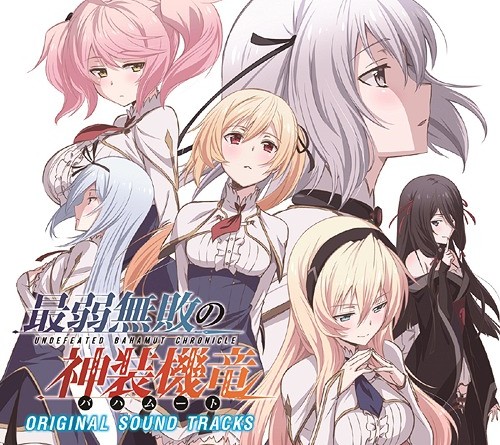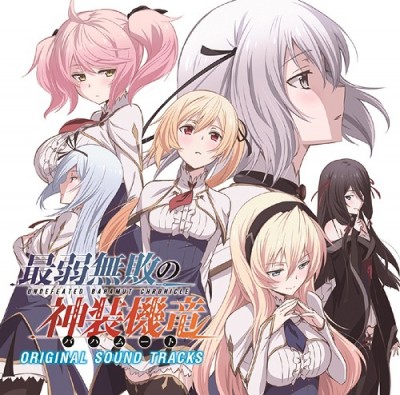“Undefeated Bahamut Chronicle” Soundtrack – Review
| Album Title: | Undefeated Bahamut Chronicle Original Soundtrack |
|---|---|
| Anime Title: | Undefeated Bahamut Chronicle |
| Artist: | Akito Matsuda |
| Catalog Number: | LACA-15552 |
| Release Type: | Soundtrack |
| Release Date: | March 23, 2016 |
| Purchase at: | CDJapan |
Tracklist
[spoiler]
| Track Title | Artist | Time |
|---|---|---|
| 01. Haya Asa Fuukei | Akito Matsuda | 1:56 |
| 02. Gakuen Fuukei | Akito Matsuda | 1:56 |
| 03. Ai Show Koshou | Akito Matsuda | 1:48 |
| 04. Shu Hime Douyou | Akito Matsuda | 1:28 |
| 05.Shu Hime Kensou | Akito Matsuda | 1:55 |
| 06. Reijou Toujou | Akito Matsuda | 1:35 |
| 07. Kizoku Shuugou | Akito Matsuda | 1:44 |
| 08. Shikan Gakuen | Akito Matsuda | 2:11 |
| 09. Sanpo Kaishi | Akito Matsuda | 1:44 |
| 10. Oukoku Ki Ryuu | Akito Matsuda | 1:42 |
| 11. Youen Iroke | Akito Matsuda | 1:51 |
| 12. Zatsuyou Ouji | Akito Matsuda | 1:49 |
| 13. Kyousei Kyouen | Akito Matsuda | 1:38 |
| 14. Ashimoto Houraku | Akito Matsuda | 1:38 |
| 15. Tameiki Ichi Ko | Akito Matsuda | 1:27 |
| 16. Takabisha Hime | Akito Matsuda | 1:37 |
| 17. Osananajimi | Akito Matsuda | 1:30 |
| 18. Eiyuu Kourin | Akito Matsuda | 0:09 |
| 19. Taiketsu Shisei | Akito Matsuda | 1:37 |
| 20. Kyouki Hatsuga | Akito Matsuda | 1:53 |
| 21. Kodai Iseki | Akito Matsuda | 2:56 |
| 22. Inbou Taidou | Akito Matsuda | 1:44 |
| 23. Densetsu Ki Ryuu | Akito Matsuda | 2:01 |
| 24. Kinchou Seppaku | Akito Matsuda | 1:44 |
| 25. Kyouteki Toujou | Akito Matsuda | 1:51 |
| 26. Kyouteki Kourin | Akito Matsuda | 2:02 |
| 27. Hi Ryuu No Kishi (piano) | Jun Sasaki | 1:57 |
| 28. Raimutsuri (guitar) | Jun Sasaki | 1:52 |
| 29. Fushi Ryuu Houkou | Akito Matsuda | 2:02 |
| 30. Yozora Miage | Akito Matsuda | 2:03 |
| 31. Kodoku Kokuu | Akito Matsuda | 1:24 |
| 32. Kioku Kaiki | Akito Matsuda | 1:48 |
| 33. Yawara Usu Koigokoro | Akito Matsuda | 2:04 |
| 34. Yuuhi Senaka | Akito Matsuda | 2:05 |
| 35. Kikkippatsu | Akito Matsuda | 2:06 |
| 36. Isshinittai | Akito Matsuda | 2:00 |
| 37. Kyodai Kyouteki | Akito Matsuda | 2:05 |
| 38. Bahamut | Akito Matsuda | 2:24 |
| 39. Zettai Zetsumei | Akito Matsuda | 2:10 |
| 40. Sai Jaku Muhai | Akito Matsuda | 2:26 |
| 41. Hi Ryuu No Kishi (TV size) | TRUE | 1:34 |
| 42. Raimutsuri (TV size) | nano.RIPE | 1:32 |
[/spoiler]
Review: How many times have we yearned for the good old days? The present has degraded – in art, in morals, you name it. I, too, am guilty of such complaints.
Five years ago, I eagerly pushed the works of Sahashi Toshihiko and Hirano Yoshihisa in people’s faces. Even now, I eagerly await their works, ignoring the barrage of new artists, most of whom have made nary a blip on my radar. At the same time, I quietly bemoan the lack of good anime soundtracks these days.
And to prove to myself that standards today just aren’t as high, I decided to listen to an absolutely uninspiring-looking soundtrack. ‘Undefeated Bahamut Chronicle’ was the perfect candidate. A cover that screams fanservice, a plot synopsis that reads like a joke, and a composer whose name doesn’t ring a bell. Just what I was looking for!
But my expectations of lazy writing and cheap execution were shattered. The very first track was anything but shabby. “Haya Asa Fuukei” starts out cheerfully before it evolves into a delightfully gentle and soothing piece. The clarinet and flute weaved beautifully amongst the strings, painting a picture of an idyllic and peaceful setting.
Haya Asa Fuukei
[audio:Haya Asa Fuukei.mp3]Alright, the first track was good. But I was certain the rest of the soundtrack would degenerate into variations of its themes in increasingly lazy ways. Again, Matsuda upended those expectations by impressing me with his diverse compositions. “Kizoku Shuugou”, for instance, tries to emulate Bach’s concertos in its structure and instrumentation. Certainly not what I was expecting.
Kizoku Shuugou
[audio:Kizoku Shuugou.mp3]There are also a number of whimsical tracks like “Zatsuyou Ouji” and “Ashimoto Houraku” that were a joy to listen to. I approve of the latter’s instrumental choices: the violin melodies dance around rapidly before being joined by others including the xylophone, flute and oboe, all punctuated by the bassoon to generate a wide range of textures.
Ashimoto Houraku
[audio:Ashimoto Houraku.mp3]Matsuda also nails the darker pieces. For instance, the cello solo in “Inbou Taidou” evokes a deep sense of foreboding through its deep and reverberating notes. The accidentals in the melody further this aura with its distorted and warped sounds.
Other tracks like “Kyodai Kyouteki” present a clear sense of danger. The track opens forcefully. It then switches to high-speed repetition to build up the sense of foreboding. This is also one of the few times in this soundtrack that a sound as harsh and powerful as the electric guitar is used, and its bold tone aptly demonstrates the formidability of the foe.
Kyodai Kyouteki
[audio:Kyodai Kyouteki.mp3]“Kyouteki Kourin”, on the other hand, rivals the works of Hirano and Sahashi by painting a dramatic scene of battle. The timpani punctuates the powerful opening and the melody gets passed from the cellos to the violins where it takes flight. The speed and urgency displayed in this piece adds to the tension, but its execution is polished and graceful.
Kyouteki Kourin
[audio:Kyouteki Kourin.mp3]One of the most powerful tracks, “Sai Jaku Muhai”, is a great demonstration of the soundtrack’s deliberate and measured execution. The piece opens quietly, but also hints of the struggle that is to come. At 0:23, this build-up breaks into the harsher tones of conflict. However, the glissando at 0:34 and the violin melody around 0:46 beautifully depict the struggle against that darkness. The addition of the brass to the violins from 1:13 adds to its strength and the harp at 1:36 and 1:50 sounds out the triumph over darkness.
Sai Jaku Muhai
[audio:Sai Jaku Muhai.mp3]Whatever the value of the anime, it appears that no effort was spared when it came to the soundtrack. If there’s one complaint, Matsuda’s music tends to go by the book. It is still good, but lacks the staying power by not being unique. Whether it is the exaggerated snob-fest in Ouran, the endless wit in Nichijou or the explosive energy in Fairy Tail soundtrack, each of those soundtracks stood out by charting new territory. Matsuda displays elements of all these works, but doesn’t push the boundaries.
Was I wrong to think that soundtracks these days are substandard, or was I merely lucky in picking something by Matsuda? I guess the only way to find out is to keep giving these new works a chance at the very least.
Rating: Good



Awesome article, mate. Music is really very nice. Can you share the full OST itself? Can’t find it on pirate sites yet.
Apologies for such a late reply! I’m afraid we don’t share OSTs on this site…
I assume you already know this, but Akito Matsuda was previously known as Nijine (maybe that name rings a bell). I think he’s one of the better “new” composers at the moment. Not to the point where I actively look for scores he’s worked on but his recent scores have been interesting, at least. Recently he’s moved more towards classical and concert style music with his scores for Glasslip and Hibike Euphonium. I think he will be someone to watch in the years to come.
P.S. Hirano has been off the radar for little over a year because he’s been working on an original album of his contemporary works (releasing in one week). Expect him to return at some point this year. 🙂
Sahashi doesn’t really take on a lot of new work these days, mostly composing for series he has previously worked on. Maybe we’ll see him return for Full Metal Panic this year.
By the way: another “new” composer, Go Sakabe, actually studied under and worked as an assistant to Sahashi and it definitely shows in his work on the Date A Live series. It’s worth checking out because he might end up being the new Sahashi, for better or for worse.
Really sorry for such a late reply! I actually wasn’t aware of much of Matsuda’s work prior to this. I share your sentiments on how he’s someone that’s worth keeping an eye out for.
Also really appreciated the heads up about Hirano and Sahashi! I feel like I’ve been living under a rock… I’ll definitely check out Sakabe’s works too!